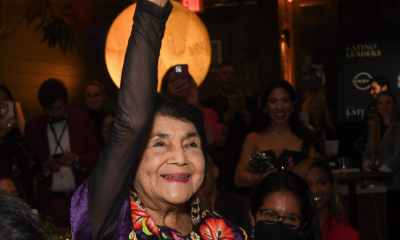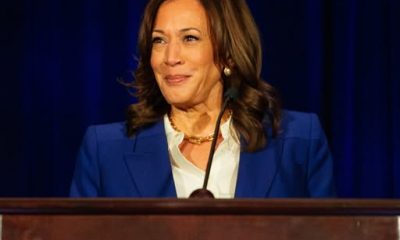Los Angeles
Schiff inspires, candidates charm at California Democratic Convention; Buttigieg surges in Iowa
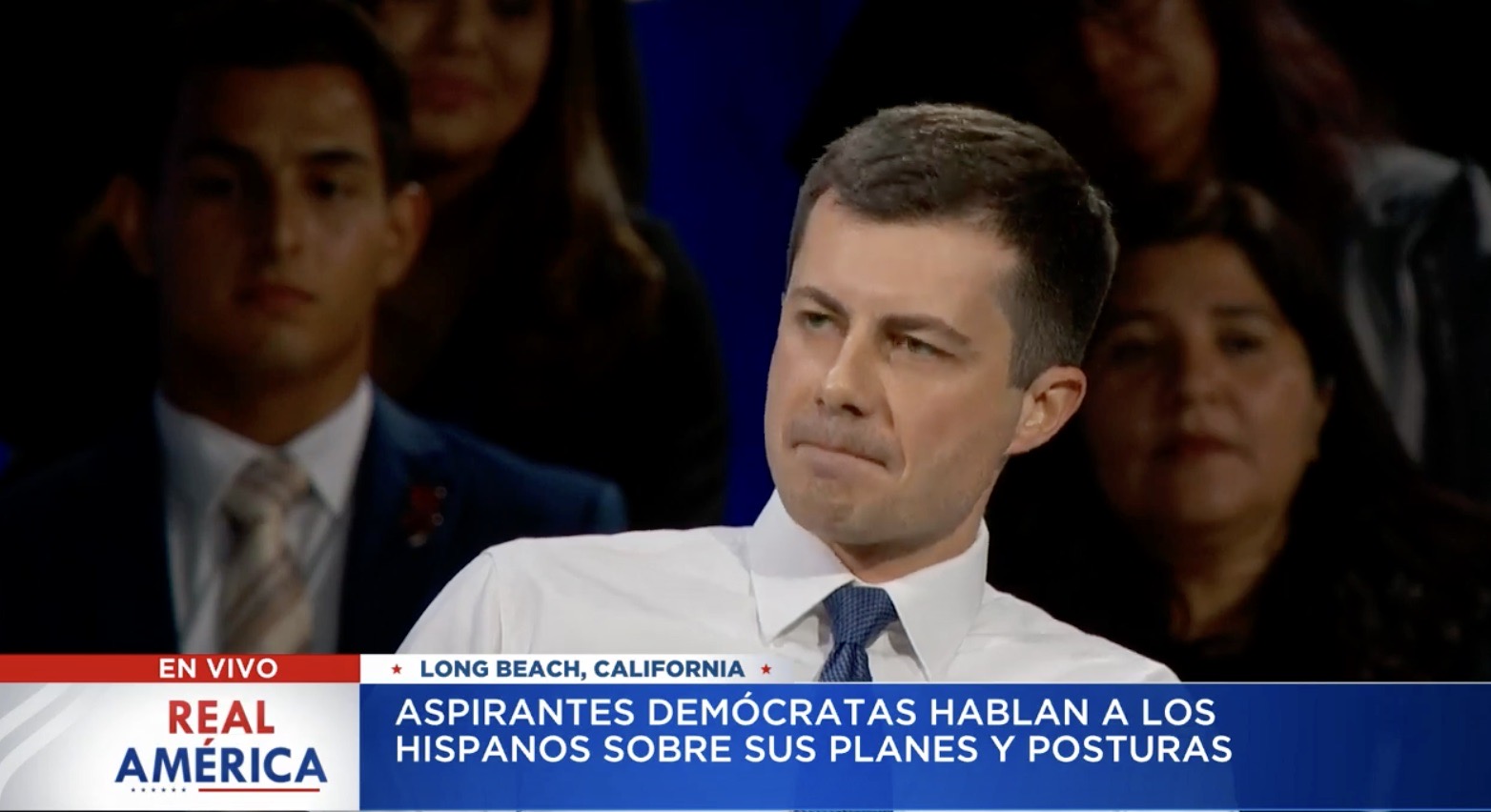
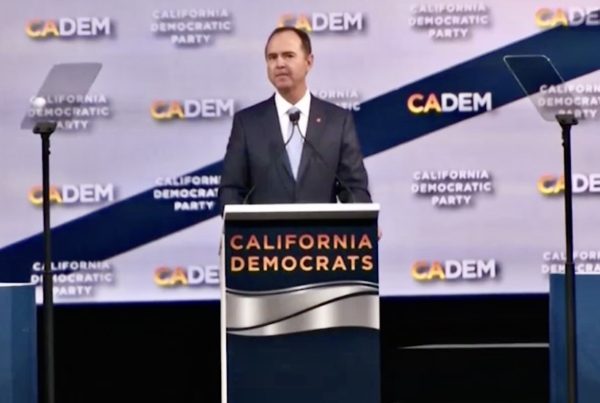
For several minutes on Saturday, the California Democratic universe stopped jousting for their favorite candidates and gave a rousing vote of confidence to Rep. Adam Schiff, who is steadily leading the House Intelligence Committee’s historic impeachment inquiry into President Donald J. Trump.
Introduced by Rep. Alan Lowenthal as “our protector,” Schiff opened his remarks to the three-day California Democratic Party (CDP) Endorsing Convention in Long Beach by acknowledging the one minute/20 seconds standing ovation.
“I feel like I should just stop there,” Schiff said wryly in a strained voice. “You will forgive me if I’m a bit exhausted. It’s been an eventful week.”
Schiff has been sounding the alarm about the Trump presidency since before he became chair of the Intelligence Committee, recalling to the Los Angeles Blade the despondency he saw Election Night 2016 at the Los Angeles LGBT Center. “The reality of the next two years proved every bit as bad, in some ways worse, than what we feared,” Schiff said Nov. 2018. “It really takes your breath away.”
It’s gotten worse, Schiff told convention delegates. “Our democracy is at risk, more so now than any time in my life,” Schiff said.
“Two years ago, I stood before you and I urged you to resist and you did. But we are more than a resistance now – we are a majority. We are a majority in one House and we will become a majority in the other and we will send that charlatan in the White House back to the golden throne he came from,” Schiff said.
“The most grave threat to the life and health of our democracy comes from within, from a president without ethical compass, without an understanding of or devotion to our Constitution and the beautiful series of checks and balances it established, setting ambition against ambition so no one branch of government could overwhelm another. And most importantly, so no despotism could take root,” said Schiff.
“There is nothing more dangerous than an unethical president who believes he is above the law,” said Schiff.
That has been a theme of presidential candidate California Sen. Kamala Harris who consistently says, “justice is on the ballot.”
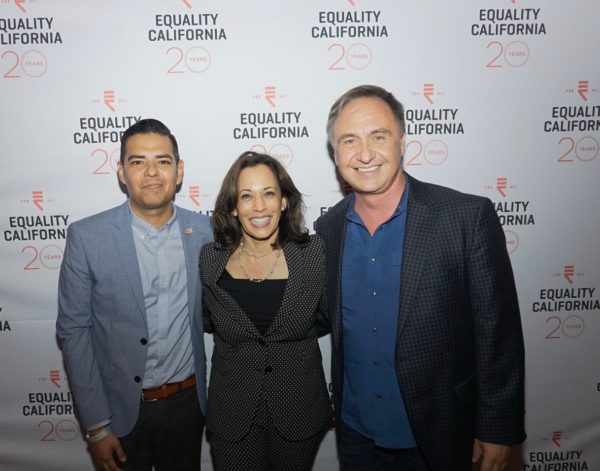
Out Long Beach Mayor Robert Garcia, Sen. Kamala Harris, Equality California Executive Director Rick Zbur (Photo courtesy Equality California)
But Harris’ campaign has been struggling of late — including a drop to 3% in the most recent Iowa poll that caused some buzz among longtime political consultants that she should drop out and save herself the embarrassment of losing in the early states and limping into her home state’s Super Tuesday Primary. However, Harris and her campaign seemed energized at the convention, including an appearance Friday night at a “Dems, Drinks and Drag Queens” party sponsored by the LGBT Caucus and Equality California. “I don’t know what you’ve been told, Kamala is strong and bold,” Gov. Gavin Newsom told reporters he plans on campaigning for her in Iowa.
In fact, all the headlines about Harris’ flagging campaign have caused something of a backlash, especially among black women who are angry that only Harris is being targeted and pressured to drop out among all the other lower-performing candidates. Harris has been endorsed by Higher Heights for America PAC, an organization “dedicated to electing more progressive Black women” that is holding several mobilization events for her in Atlanta, Georgia and Columbia, South Carolina following Wednesday night’s Democratic debate. The Friday, Nov. 22 event features LGBTQ icon actress Sheryl Lee Ralph.
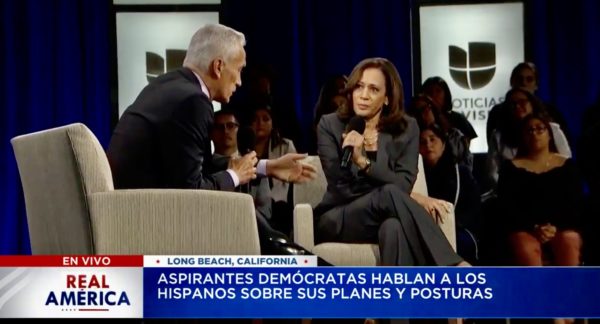
Harris was the first of eight presidential candidates to take the stage at the CDP/Univision forum Saturday afternoon, which was broadcast and live streamed in both English and Spanish.
Many Democrats were confused and angry that former Vice President Joe Biden and Massachusetts Sen. Elizabeth Warren skipped the endorsing convention. Univision correspondent Jorge Ramos told the forum audience that their absence illustrated a broader problem with Democrats because “they know they’re going to get about 70% of the Latino vote and they just take it for granted.”
Taking the Latino vote for granted in California is especially unwise now since this year marks the 25th anniversary of the passage of Prop 187, the Republican anti-immigration initiative that dramatically changed the California political landscape. Latino voters surged in response and the GOP started its steady decline — registering now as a third party behind No Party Preference among California’s 20,328,636 registered voters, 44.1% of whom are Democrats.
Turnout is another matter, according to PPIC. “Voter turnout continues to lag among nonwhite Californians,” PPIC reported last August. “Our surveys over the past year indicate that 45% of Latino adult citizens, 53% of Asian American adult citizens, and 57% of African American adult citizens are likely to vote, compared to 68% of non-Hispanic white adult citizens…. Latinos—California’s largest racial/ethnic group—represent 35% of the adult population, but they account for only 19% of those most likely to vote. Asian Americans comprise 15% of the adult population and 13% of likely voters. The share of African American likely voters matches their representation in the adult population (6%).”
PPIC apparently does not consider California’s LGBTQ population a demographic worth counting.
The need to reach and inspire Latino voters is considerable since California starts vote-by-mail on Feb. 3, for the March 3 Super Tuesday Primary, with nearly 500 delegates at stake. Feb. 3 is the same day as the Iowa Caucuses – and California Democrats have long helped phone bank, fund and advocate for their candidates in the Nevada Democratic Caucus, this year on Feb. 22.
In addition to the CDP/Univision forum, Harris, out South Bend, Indiana Mayor Pete Buttigieg, Vermont Sen. Bernie Sanders, former HUD Sec. Julian Castro and investor-philanthropist Tom Steyer participated in a 90-minute forum at Cal State Los Angeles on Sunday, which was sponsored by the Pat Brown Institute for Public Affairs at Cal State Los Angeles, the California Latino Legislative Caucus and the Coalition for Humane Immigrant Rights of Los Angeles (CHIRLA).
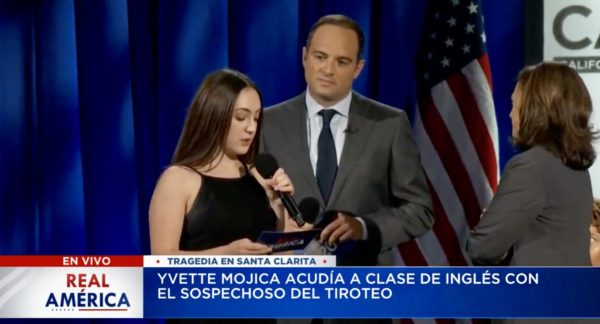
Univision smartly began their forum with a question from Yvette Mojica, a student at the Saugus High School in Santa Clarita, who wanted to know what Harris would do to help her feel safe about going back to school without being afraid of being shot.
Harris, who has herself experienced the sudden threat of violence, addressed the trauma that’s now the norm among school children.
“I’m sick of what happened to you, to your classmates, I’m sick. I’m fed up with it and it’s got to stop,” said Harris, adding that even elementary students think shooter drills are “normal.”
“And these tragedies keep happening, which tell them that they need to pay attention,” Harris said. And “instead of opening their minds to the wonders of science and art and math, half their brains are worried about who’s going to come bustin’ through the door. It is traumatizing our children and it’s got to stop.”
Harris said that as president, she would take executive action if Congress didn’t present her with a bill in her first 100 days.
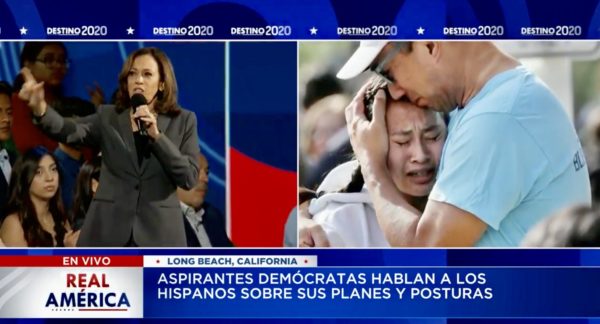
Harris segued from mass shootings to the trauma experienced by children afraid to come home to find their undocumented parents taken away by ICE.
And with that, Ramos asked the question that Joe Biden probably expected would be asked: “Can we have an honest conversation about Obama’s legacy? Of course, he gave us Obamacare and DACA and the Paris Agreement. And of course, the country was going through a terrible economic situation, I agree with that. However, he deported more than three million people. Was that a mistake? Do you think President Obama made a mistake?”
Harris probably expected that question, too – but not framed in a way that would create a sound bite around the word “mistake.”
She dodged and stalled. “I think that President Obama did many great things and is probably one of the greatest presidents we’ve ever had,” Harris said as the audience applauded.
“I think many people agree with that but he deported three million people,” Ramos said.
Harris shifted to how, as California attorney general, she disagreed with the policy and “informed California law enforcement that ICE detainers are not mandatory.”
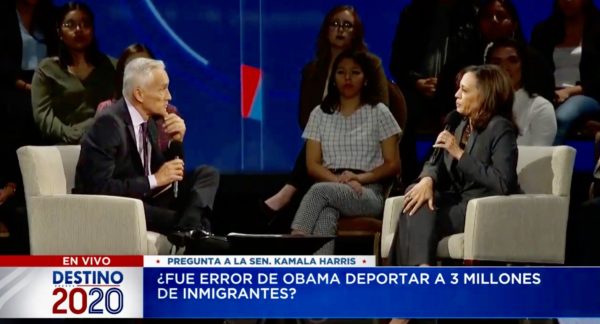
“So, do you think he made a mistake?” Ramos asked
“Because I was aware that there were people who were by ICE’s own definition, non-criminals, that were being deported. That was wrong,” Harris said. “I disagreed with it and that’s why I issued that policy for the sheriffs and the district attorneys of California telling them that these were not mandatory.”
That Harris had not used the word “mistake” was underscored when Ramos asked the same question of popular Bernie Sanders, who is the largest recipient of Latino contributions and drew crowds of young Latinos in LA – and Sanders answered quickly with a simple “yes.”
Sanders then pivoted. “What I’m going to tell you is in fact what the American people want, and they want to stop this ugly demonization of the immigrant community and the racism that is coming from the White House,” Sanders said against the larger backdrop of calls for the ouster of white nationalist/deportation mastermind Stephen Miller.
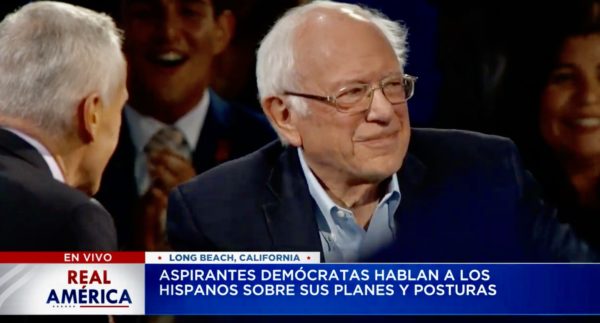
Sanders pledged to reestablish legal status for 1.8 million “Dreamers” on Day 1 of his presidency.
Harris, however, ended the day with the endorsement from the highly regarded, 10,000-member United Farm Workers. She had already been personally endorsed by civil rights icon Dolores Huerta, who co-founded UFW with Cesar Chavez and Gilbert Padilla.
Sanders, who emphasized that his health is good after his heart attack, came out of the convention with the endorsement of the California Young Democrats and the earlier endorsement of the powerful California Nurses Association, affiliated with the National Nurses United.
Meanwhile, during his time in LA, Sanders also endorsed the Rental Affordability Act, a ballot initiative by AIDS Healthcare Foundation on the Nov. 2020 ballot.
The biggest surprise of the convention was the news after his forum performance that Pete Buttigieg had surged to the lead in the Des Moines Iowa poll. He jumped to 25% in the new CNN/Des Moines Register/Mediacom poll of likely Iowa caucusgoers — a 16-point increase since the September CNN/DMR poll.
There was a three-way battle for second place with Elizabeth Warren registering 16%, and Joe Biden and Bernie Sanders coming in at 15%.Minnesota Sen. Amy Klobuchar jumped to 6%, while Harris, Steyer, New Jersey Sen. Cory Booker, Hawaii Rep. Tulsi Gabbard and businessman Andrew Yang all ranked at 3%.
Interestingly, former New York Mayor Michael Bloomberg — who has not officially entered the race — got 2%. In fact, Bloomberg created the other major surprise of the weekend by apologizing for his “stop-and-frisk” policing policy during an appearance at a black megachurch in Brooklyn on Sunday. “I’m sorry that we didn’t,” Bloomberg said. “But I can’t change history. However, today, I want you to know that I realize back then, I was wrong.”
Adding another surprise on Monday — Bloomberg received the endorsement of Columbia, South Carolina Mayor Steve Benjamin.
“He’s got what it takes and he’s got the resources to take it to Trump,” Benjamin told AP in an interview. “I believe firmly that Mike Bloomberg can win. I think resources are going to matter.”
Buttigieg was circumspect after hearing the polling news in Long Beach, saying they were “extremely encouraging.” But, he added, “We have felt a lot of momentum on the ground.”
To some pundits, Buttigieg’s surge means Iowa voters are favoring a more centrist agenda, underscored by the new presidential ambitions of Bloomberg and former Massachusetts Gov. Deval Patrick, who attended the Long Beach convention, got a few nods and didn’t get booed.
Last Friday, former President Barack Obama expressed concern to a clutch of wealthy liberal donors about more progressive Democratic candidates getting out over their skiis with “big structural” change proposals on health care and immigration issues.
“Even as we push the envelope and we are bold in our vision we also have to be rooted in reality,” Obama said. “The average American doesn’t think we have to completely tear down the system and remake it.”
And Buttigieg fits right in that scenario during the Univision forum.
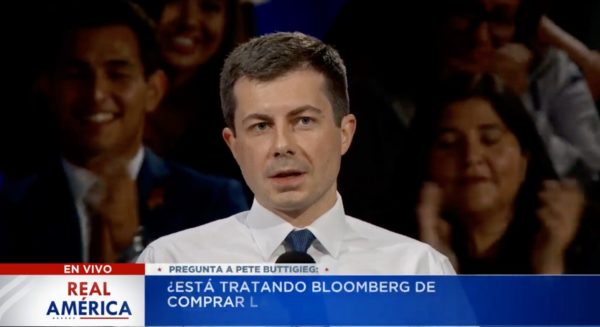
After a few pleasant exchange in Spanish — Buttigieg speaks seven languages — KMEX anchor Leon Krauze asked him about Bloomberg and Patrick getting in the race. “Some seem to doubt whether the current group of candidates is strong enough to beat President Trump. Is it?
“First of all, I think every one of the candidates competing on the democratic side would make a monumentally better president than the one we have right now,” Buttigieg said, adding that he thinks he’s “the best person to go into that competition, but the job is for each of us to go out there and prove it.”
Buttigieg said it was not his “place to characterize somebody else’s plan,” regarding Warren saying she wouldn’t not push for Medicare-for-all until the third year of her presidency. But he still has concerns about commanding people leave their private plans.
“I would rather allow Americans to make the decision for themselves, so the idea of our plan, Medicare-for-all who want it, is we make it available for everybody, but we trust you to decide whether and when you want it,” he said. “And my thinking is if this is the best plan for everybody, then everybody will choose it and it will become the single payer. If, on the other hand, there remains some Americans — I’m thinking, for example, about a lot of union members who negotiated good private plans who would prefer to keep their plan — I’m not going to command them to abandon that plan.”
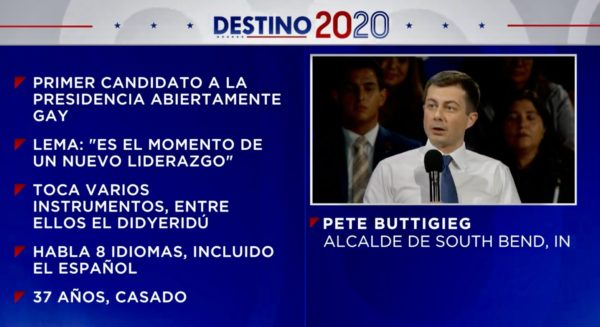
Buttigieg was also asked about Obama’s apparent advocacy for centrism.
“Here’s what I agree with is the idea that the role of activists is to move the country as far forward as possible and to tug the politicians forward,” Buttigieg said. “That’s different from the role of those seeking office and holding office who have to balance the concerns of different constituencies. But I also believe that being bold and having big ideas should not be measured by how many people you alienate. Because the things I’m proposing, for example, it’s true that they’re not as extreme as some of the others, but they would still make me the most progressive president of my lifetime.”
Buttigieg said:
“The most important thing is to put forward the policies that we believe make the most sense. But also, I think this is very important — right now, there is an American majority ready to back us up, not only on issues like minimum wage and family leave where people have trusted Democrats for a long time, but in the areas where Democrats had been on defense in the past — guns, immigration, healthcare. We should do everything we can to hold that majority together, galvanize, not polarize it. And if we can do that, and I’m talking not just about how to win elections, but how to govern, if we can hold that majority together in a unifying way for a divided country, we have the opportunity to deliver the boldest, biggest changes that we have seen in longer than I had been alive.”
Buttigieg said that, as a veteran, his foreign policy involving committing American troops to conflicts abroad would be “based on the need to save American lives, the knowledge that there is no reasonable alternative, and the network of alliances that helps save American lives and preserve American interests. All of those things have to go together.”
The “real tragedy” of Trump’s “betrayal in Syria is that what you had there was preventing endless war.”
Buttigieg also addressed drug cartels killing Americans in Mexico, border security, the cost of caregiving, and, mass school shootings.
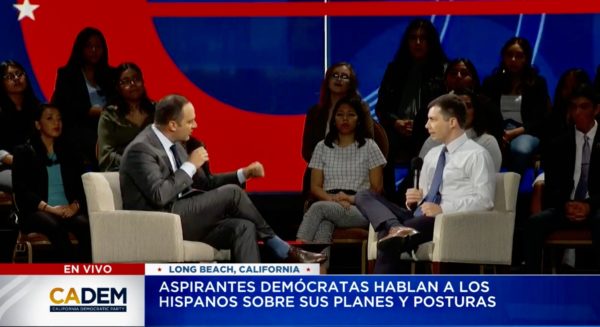
“Finally, Mayor, over the last ten years around 150 shootings have been committed by children, teenagers, minors, 17 and younger. How do we keep guns outside the access of children, at least children?” Krauze asked.
“This is something that has affected my community,” Buttigieg said, referring to South Bend, not Pulse nightclub. “The darkest moments I think for most mayors are the moments when you find yourself consoling parents of children who have been killed or teenagers who have been killed in violence and often it is also teenagers perpetrating gun violence. It is why the time has come to insist that it is a matter of national security that we stop allowing the Second Amendment to be distorted into an excuse to do nothing whatsoever when it comes to common sense gun policy.”
“The things I trained on in the military have no business being sold for profit in American communities,” Buttigieg said. “They’re weapons of war.”
With 90% of Americans, including most gun owners, including most Republicans, supporting background checks and the red flag laws, why has Congress not acted?
“This is what tells us that our democracy is broken and that gerrymandering, money, and politics and the other distorting forces that make our democracy less democratic need to be confronted and need to be reformed to deal with this and every issue,” Buttigieg said. “Everybody can have a water balloon, nobody can have a nuclear weapon. Anyone can have a slingshot, nobody can have a predator drone. So this is not some new constitutional idea we are asserting. It’s just that we’ve got to decide where to draw the line and we need to draw the line tighter than we have so far.”
Buttigieg was not asked if Obama made a mistake deporting 3 million people.
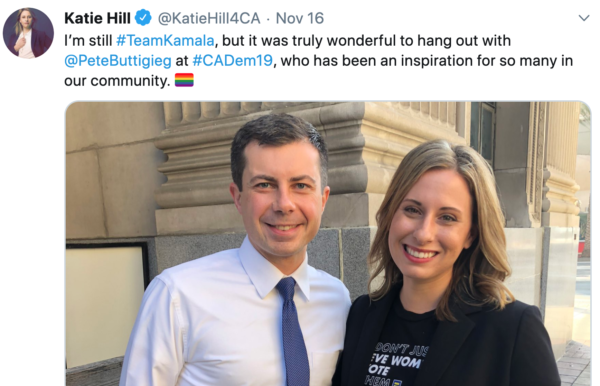
While Buttigieg may have charmed Democrats in Long Beach — including former Rep. Katie Hill who supports Harris but likes Buttigieg — he still has a major problem with black voters as illustrated by the NBC News headline on Sunday: “Pete Buttigieg is struggling with black voters — and not just because he’s gay.”
Janell Ross reported:
“ROCK HILL, S.C. — On a recent Sunday morning, Pete Buttigieg stood before rows of black churchgoers, a group he and the other Democratic 2020 candidates must win over for a reasonable chance of capturing their party’s presidential nomination.
“I know what it is to look on the news and see your rights up for debate,” he told the crowd gathered in the sanctuary of an African Methodist Episcopal events center in Rock Hill. “I also know what it is to find acceptance where you least expect it and to find compassion when you most need it.”
As Buttigieg, the mayor of South Bend, Indiana, highlighted his personal knowledge of the marginalized American experience, and as he quoted verses from the books of Proverbs and Matthew, he did not overtly describe himself as gay or mention the husband he adores. He was trying to connect with a group of potential voters who, on the whole, have been skeptical of his candidacy.”
“The true Pete Buttigieg test, the one he’s unquestionably failing,” Andra Gillespie, an Emory University political scientist, “has to do with the résumé and the issues.”
“Buttigieg must contend with questions about his record on race, police accountability and crime reduction in South Bend, which came to the forefront after police there shot and killed a black man in June. The city’s violent crime rate is double the average of comparably sized cities. And the number of shooting victims in the city has nearly doubled since 2018. Buttigieg was also criticized for firing the city’s first black police chief, who viewed himself as working to expose and remove racist white officers, in 2012, the year Buttigieg took office. Buttigieg is widely perceived as not having handled the situation well,” Ross reports.
That, and Biden scored 21 to 39 points ahead of Buttigieg in a series of South Carolina Democratic polls last October.
On Monday, two days before the MSNBC/Washington Post Democratic Primary debate, Buttigieg is in Atlanta with an appearance at Morehouse College where he will have the opportunity to explain the campaign screw up of putting the photo of a black woman and young boy on the cover of Buttigieg’s Douglas Plan to combat racial inequality, which the candidates billed as a “comprehensive investment in the empowerment of black America” —only to discover the photo was a Kenyan woman portrayed in a stock photo.
“This is not ok or necessary,” tweeted Rep. Ilhan Omar (D-Minn.), a Somali-born refugee.
The campaign apologized and said it was “selected while a contractor was running our site.”
There are other issues dogging the campaign. But Buttigieg’s “bold new plan to grow paths to opportunity for all Americans through more affordable college as well as through workforce development and training opportunities,” announced Monday, plus his pledge to make a historic $50 billion commitment to HBCUs, may prompt young black voters to listen to his plans and not make the 37-year old candidate’s mistakes emblematic of his character, his intellect or his ability to compete with others to defeat Trump.
The California Democratic Endorsing Convention ended with only a handful of state and federal seats pulled from the Consent Calendar for further consideration. There was no endorsement in CD 25 in the contest to replace former Rep. Katie Hill because there was not enough time under party rules to consider Assemblymember Christy Smith and her apparent likely Democratic opponent Cenk Uygur who Equality California and others have accused of using anti-LGBTQ, sexist, Islamophobic and anti-Semitic rhetoric in multiple videos posted on Twitter. This could be an expensive distraction from keeping the seats Democrats flipped in 2018 out of the hands of Republican Steve Knight who is fighting to get that seat back.
If Donald Trump isn’t impeached and removed from office, 2020 could prove to be the most expensive year for elections in America history.
Los Angeles
Nikko LaMere’s photo exhibit “JOY!” documents the euphoria of Black queer nightlife
Now available to view at the LA LGBT Center, “JOY!” is a raw preservation of Black queer nightlife, fantasy and self-discovery.

It’s 2018, inside queer dance party Ostbahnhof, and the floor is packed with a sweaty, hypnotic energy as people groove to the sexy, lush soundscapes of techno and deep house. Photographer and visual artist Nikko Lamere rushes to grab their disposable camera, accidentally spilling some of their whiskey ginger on someone, and snaps a couple of shots of their friends: immortalizing their uninhibited joy and movement forever.
Eight years later, these photos LaMere captured across various local queer dance parties comprise their newest and largest photo exhibition yet: “JOY!” Displayed at the Los Angeles LGBT Center, “JOY!” is a raw documentation of Black queer nightlife, fantasy, and euphoria. It includes two of LaMere’s major bodies of work and follows the artist’s queer journey and creative evolution.

The exhibit’s opening on Feb. 13 is one of two events in the Center’s “Highly Favored” programming series that uplifts Black queer liberation every February. The next event comes this Saturday, and is a celebratory dance party akin to the ones documented in LaMere’s photos.
Prior to this exhibit, LaMere was most known for their saturated and stylized editorial work with contemporary music phenoms like Doja Cat, SZA, Latto, Billie Eilish and Kehlani. Propelled at a young age into flashy spaces with modern-day tastemakers and legends, LaMere sought refuge in photography throughout their adolescence. Their fascination with the camera began in elementary school while growing up in Culver City, when their grandmother gifted them a Nickelodeon-themed camera to take photos with.
Their eye and talent were reinforced with praise, and this love for the craft grew from curiosity to solace in high school. Bullied for being gay and femme, LaMere sought refuge at the library, where they first discovered the technicolor, surreal work of visionary photographer David LaChapelle. This became a direct pathway for LaMere’s own career: one that, though successful and fulfilling in its own way, led to a need for change.
For so long, the camera was a means to fulfill someone else’s vision. Now, LaMere began to use it as a tool for connection and raw documentation. In 2018, they didn’t set out to create what is now their “In the Night” photo series; they were simply trying to explore their own queer journey, and preserve the friendships and environments that made them feel comfortable in their own skin.
That vulnerable process of “becoming” is one they hadn’t touched upon in their previous work. For the first time, they couldn’t carefully and methodically create the shot; whatever they snapped was based purely on instinct, a fleeting moment of true and embodied tenderness, ecstasy, and freedom.
“To have this body of work shot all in black-and-white, for it to be so gay and Black — it feels really affirming,” LaMere said. “These are the most raw images and things I could create. There’s no Photoshop. There’s no retouching. It’s literally straight from the camera. It just is. I think part of joy is being able to just be, and that’s what these images are.”

“JOY!” also includes LaMere’s work, “Queer Fantasy,” a collection of 40 black-and-white film portraits and interviews with local queer performers, artists, and everyday people. This newer project grew from the core of “In the Night,” and is another intentional project focused on highlighting the beauty and individuality of queer Angelenos. Each person is asked: “What is your queer fantasy?,” illustrating that queer fantasy is not only a transformative kind of rebirth: it is a process built by radical efforts to cultivate joy, success, and safety in the face of violence and discrimination.
For LaMere, “JOY!” is about this process and the moments of self-discovery found on the dance floor, where you can really feel tethered to the person you’re becoming while “the world is burning around you.” While speaking with LaMere, I am grounded by the words of DJ, artist and organizer Darryl DeAngelo Terrell.
“Here, in this space we as black people [are] forced to find liberation in our own bodies, it’s in us, deeper than melanin, and it is activated by bodily acts,” Terrell writes. “We Move* in ways that others can not fathom to understand. Through these acts, we find the most beautiful yet temporary forms of true freedom; we find joy, peace in these acts.”
“JOY!” is available to the public on Wednesdays and Thursdays from 11 a.m. to 4 p.m. More information about the exhibit and “Highly Favored” can be found here. This Saturday’s queer dance party will also honor special guests Hailie Sahar, a starlet on the revolutionary FX show Pose, as well as filmmaker and ballroom culture documentarian Elegance Bratton.
Kristie Song is a California Local News Fellow placed with the Los Angeles Blade. The California Local News Fellowship is a state-funded initiative to support and strengthen local news reporting. Learn more about it at fellowships.journalism.berkeley.edu/cafellows.
Los Angeles
A new “queer summer camp” cycling event rises from the legacy of AIDS/LifeCycle
The LA LGBT Center will host its first ever “Center Ride Out,” a 3-day community cycling adventure from Los Angeles to San Diego.

On April 24, 500 cyclists will meet at Elysian Park before dawn, stretching and preparing for a 110-mile ride through urban scenery and rolling hills. They will be part of the Los Angeles LGBT Center’s inaugural “Center Ride Out,” a 3-day journey that takes riders through Los Angeles and Temecula, reeling to a stop at the San Diego LGBT Community Center.
The cycling adventure is a rejuvenating, communal queer experience that taps into the importance of shared joy and advocacy in the fight to defend LGBTQ+ rights. Its roots are sacred for many queer elders: Center Ride Out rises from the legacy of the cherished AIDS/Life Cycle (ALC), a seven-day cycling adventure from San Francisco to L.A. that formed in 1994 and ended with its last ride in 2025.
In its 31-year run, ALC riders raised over $300 million for HIV and AIDS resources, services, and awareness. This year, Center Ride Out provides a new, exciting extension of this important event, allowing cyclers to raise funds in support of the LA LGBT Center, The San Diego LGBT Community Center, and the LGBTQ Community Center of the Desert.
This support is crucial as LGBTQ+ organizations face a new crisis: widespread defunding. In the last fiscal year, the LA LGBT Center lost $9 million in federal support, according to its CEO Joe Hollendoner. The funding raised by Center Ride Out’s participants will help offset this loss and keep the organization’s various programs and services, from gender affirming care and HIV prevention resources to LGBTQ+ senior and youth support, afloat. “We anticipate further divestment in our work by the Trump administration, [so Center Ride Out] allows people to align their own personal passions with our mission in a broader way,” Hollendoner told the Blade.
Altogether, Center Ride Out participants will cover nearly 200 miles of ground together. At the end of the first 110-mile day from L.A. to Temecula, where riders will get to look at historic landmarks and embark on a museum lunch stop together, the day culminates at campgrounds at Lake Skinner.
Here, riders can take a full rest day at their lakeside camp, where it will exude queer summer camp vibes. There will be massage and medical services, arts and crafts activities, dance parties, and time to relax and connect with the community. “Folks [can] build relationships, have some fun, and feel safe. That’s a feeling a lot of people [need] right now, especially our trans and nonbinary siblings,” Hollendoner said.
Day 3 ends with an 87-mile downhill, coastal ride through the town of Rainbow in northern San Diego County, before ending with a celebratory bash at the San Diego LGBT Community Center.
Hollendoner rode ALC five times while it was active and is excited to be part of this new legacy from its very beginning. “I’ve heard our community elders talk about how powerful it was to be at the start of AIDS/LifeCycle, and the idea that I can be here at the start of Center Ride Out, an event that I hope will go for three decades or longer…It feels really exciting to me,” Hollendoner said.
For newcomers and experienced cyclists alike, Center Ride Out aims to provide an accessible experience: paring down the initial weeklong ALC ride to three days. To take part, cyclists are expected to raise $2,500 by April 10. For those who may struggle to reach this minimum, staff members have established a community fund.
The community fund will also provide scholarships for BIPOC, trans, women, and femme participants — historically underrepresented communities at ALC — as well as microgrants for BIPOC and trans-led teams to encourage a diverse range of cyclists.
Come April, scores of queer cyclists will get to experience this adventure together: one that is both storied and fresh in its purpose, lineage, and joyful expression of queer togetherness. “Center Ride Out is providing an exciting opportunity for people to not only fight back and be in community with one another, but to build resiliency and be surrounded by people who share values around liberation,” Hollendoner said.
To learn how to register, donate to or volunteer for Center Ride Out, more information can be found here. The three-day adventure takes place from April 24 to April 26.
Kristie Song is a California Local News Fellow placed with the Los Angeles Blade. The California Local News Fellowship is a state-funded initiative to support and strengthen local news reporting. Learn more about it at fellowships.journalism.berkeley.edu/cafellows.
Los Angeles
Stonewall Young Democrats bounces back from “quiet year” with Hero Awards

On Saturday, Feb. 7, the Stonewall Young Democrats (SYD), an organization that mobilizes and fosters community for young, LGBTQ+ people, hosted its “Hero Awards” ceremony at Beaches West Hollywood. Under luminous pink light, vibrant crowds of community members showed up to support and celebrate people and organizations spearheading LGBTQ+ visibility, change, and livelihood across L.A. County. Political figures filled the venue wall to wall, including LA Mayor Karen Bass, West Hollywood Mayor John Heilman, West Hollywood Council Member John Erickson, and California Assemblymember Rick Zbur.

Several local advocates and politicians were honored for their queer advocacy and leadership, including City of Los Angeles LGBTQ+ community affairs liaison Carla Ibarra, L.A. Democratic Party Chair Mark Ramos, Congressman Mark Takano, and L.A. County LGBTQ Commission Chair Sydney Rogers. The Los Angeles Blade was also recognized with an Impact Award.
Los Angeles Blade publisher Alexander Rodriguez accepted the award. In his acceptance speech, Rodriguez shared, “We report on and share the struggles of our queer community. We also get to see the resilience and strength our community has, even in the face of adversity. We see firsthand the importance of the Stonewall Young Democrats and the amazing network of people they have put together, as seen here today.”

The Stonewall Young Democrats formed in 2004, immortalizing the 1969 Stonewall riots in its name. The decision to carry the legacies of early gay rights movements is poignant: queer resistance and their enduring battle against political and social marginalization and violence are seared into the organization’s core.
SYD’s President Kanin Pruter is keeping this link to the past alive; it’s a reminder of the interconnectedness of the queer community. “Our history is there for a reason,” Pruter told the Blade. “Without lesbians during the AIDS crisis, we would not be where we are today. And our movement was started by Black trans women.”
This recent Hero Awards marks SYD’s revitalization. After a relatively quiet year, its board is excited to grow its organization, recruit diverse and eager LGBTQ+ folks, and create fruitful opportunities for everyone in the organization to develop their political advocacy and organizing skills.

Most importantly, Pruter hopes that SYD can be a safe, inclusive, and accessible space for any LGBTQ+ person who has felt outcast before. “In a loving and joking way, we’re an island of misfit toys,” Pruter said, who is intentional about creating environments where queer folks who have experienced trauma, isolation, and exclusionary social politics can fit in and belong.
“I want folks to be open, vulnerable and leave any preconceived notions at the door. We come in here [and] we are who we are. We respect each other’s identity, and we’re here to foster a culture where everyone feels welcome.”
Pruter encourages young LGBTQ+ people who are interested in getting involved in SYD, to contact him and learn more about the organization. More information can be found here.
Kristie Song is a California Local News Fellow placed with the Los Angeles Blade. The California Local News Fellowship is a state-funded initiative to support and strengthen local news reporting. Learn more about it at fellowships.journalism.berkeley.edu/cafellows.
Los Angeles
Project Angel Food is now able to feed 10,000 people daily with expanded building
On Thursday, community gathered to celebrate Project Angel Food’s new kitchen and campus building, which allows them to serve more of the county’s critically ill community.
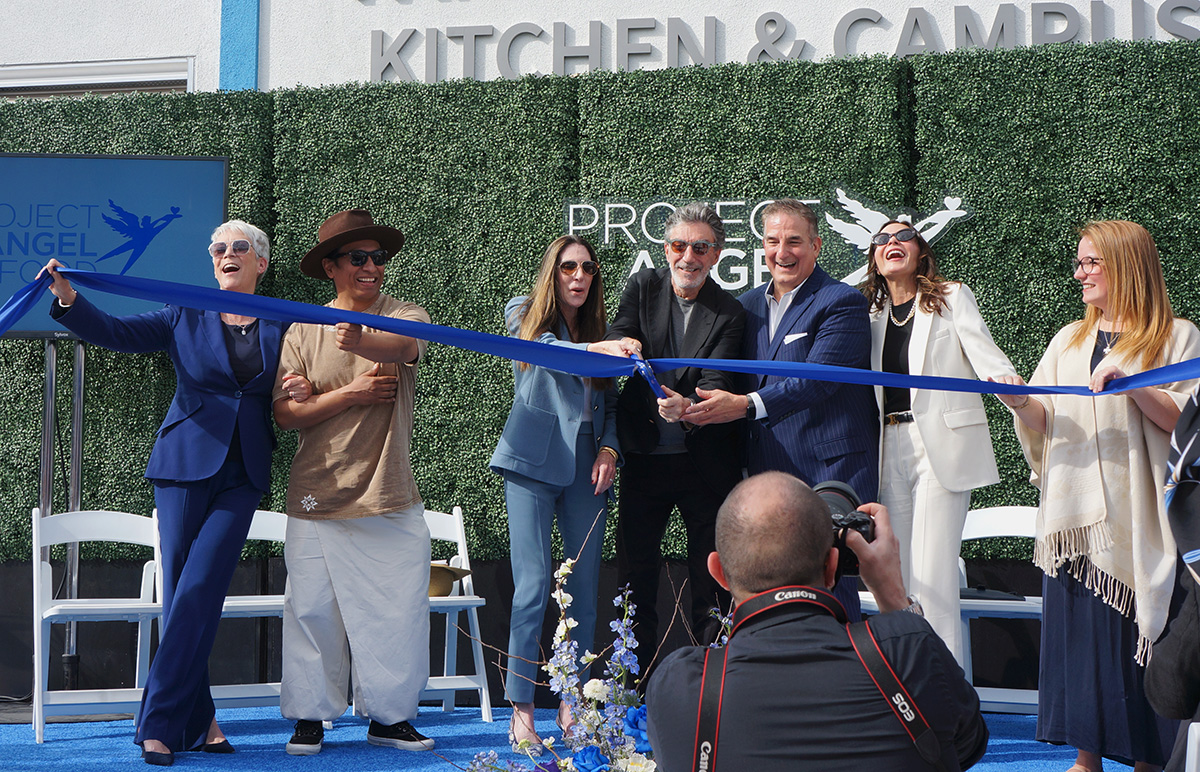
On Feb. 5, community members gathered at 922 Vine Street to celebrate the expansion of Hollywood-based non-profit Project Angel Food. That Thursday morning, the organization cut the ribbon for its Chuck Lorre Family Foundation Kitchen and Campus: one of two new buildings that greatly increase its capacity to provide healthy food and nutritional resources to the county’s critically ill community members.

Project Angel Food was founded in 1989 by author and activist Marianne Williamson and blossomed from a dire need to feed people impacted by HIV/AIDS during the epidemic. Today, the organization cooks and delivers over 1.5 million meals, tailored to specific needs that include chronic illnesses and gastrointestinal issues, to 5,000 people across Los Angeles.
In August 2023, the organization launched its “Rise to the Challenge” campaign, a multi-year expansion and renovation project backed by $51 million. Now, its first phase is complete, and its impact is expected to double.
With the new Chuck Lorre Family Foundation Kitchen and Campus, Project Angel Food’s kitchen staff — which, like the rest of the organization, is majorly powered by volunteers — has access to 16,000 square feet of expanded space, which includes more ovens, walk-in freezers, and hot cook lines than they’ve ever had access to previously. Project Angel Food CEO Richard Ayoub explained today that this will allow staff and volunteers to serve 10,000 people a day.
The organization’s executive chef, John Gordon, explained to the Blade that “space issues” were a major hindrance previously. Before the new kitchen was opened, staff worked out of a much smaller Lincoln Heights facility. “If you didn’t get the rack, you don’t have the sheet pans. If you got the sheet pans, you don’t have the last chiller,” Gordon said, explaining how difficult it was before to balance multiple tasks in the same space. Now, their team of seven chefs, 12 kitchen assistants, dishwashers, and volunteers can work in several cook lines at the same time.
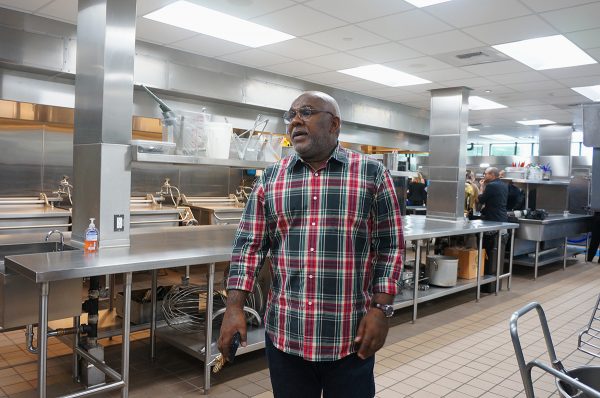
“We’re much more efficient this way,” Gordon continued. In the kitchen, the day begins at 8 a.m. Someone will pick music for the morning, setting a groove for staff as they sync up to review recipes, pack meals prepared from the day before, and cook meals for the next day ahead. After a lunch break, they continue to work until 4 p.m. to make sure they’re meeting the needs of the community they serve.
For locals like Celeste, a Project Angel Food client who is affected by multiple sclerosis, this service is crucial. On days the disability “really takes effect,” being able to receive nutritious meals customized to her needs makes a meaningful difference. “Some days, I’m not able to get up,” Celeste said. “Just that one meal [can] give me an extra boost [and] allow that sun to shine brightly even on my rainy days.”
For advocates and Project Angel Food supporters, Thursday’s celebration was also an act of resistance and a bold declaration against the federal administration. Jamie Lee Curtis, the honorary co-chair of the “Rise to the Challenge” campaign, spoke of the “love” that lay at the core of Project Angel Food’s foundation: a kind of love she finds completely absent in the federal administration.
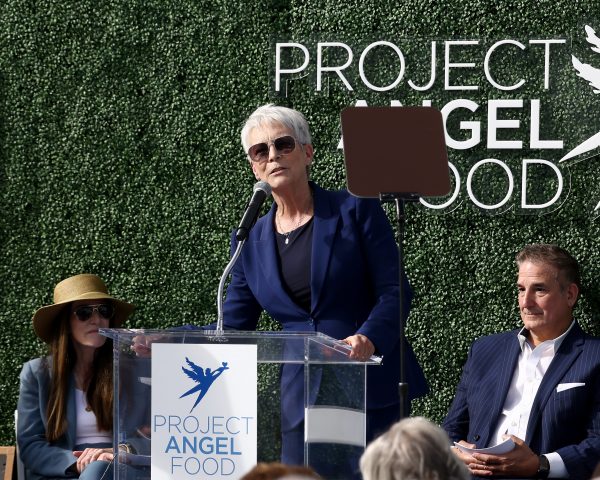
“We are a community here today the same way they are in Minnesota, and I feel like what they’re doing is what we’re doing,” Curtis said to the crowd, defiance firm in her voice. “And we’re only going to get any shit done if we do it together and defy these motherfuckers.”
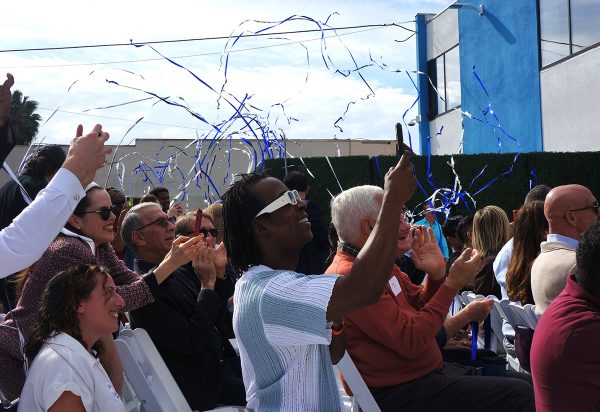
County supervisor Lindsey Horvath, a former delivery volunteer at Project Angel Food, affirmed this statement and guaranteed the county’s continued support in the organization. Horvath spoke of the government’s “glaring absence” during the HIV/AIDS epidemic: one that is “eerily similar” to its attitude now.
As the government mobilizes Immigration and Customs Enforcement (ICE) agents, sending immigrant communities spiraling into crisis, on-the-ground organizations like Project Angel Food are standing in firm support of their marginalized and ill community members. Horvath’s confirmation of county support is also rooted in this mission.
The building’s exterior also reflects the organization’s dedication to its residents. On the south side, a new large-scale mural painted by esteemed local muralist Robert Vargas highlights the stories of local volunteers and vendors who live and work in the neighborhood. Vargas explained that seeing these people in action “crystallized” the dedicated service and harmony that exists among the organization’s volunteers, clients, staff, and nearby community members.
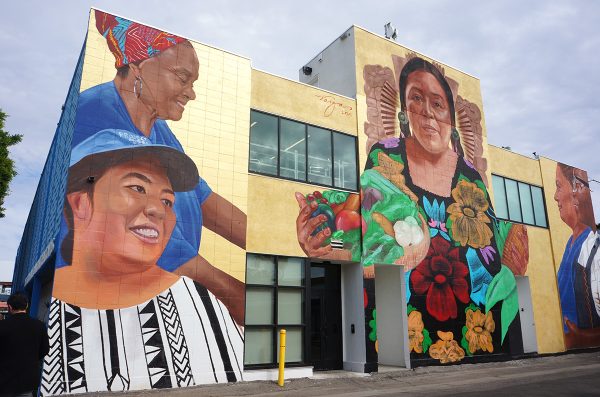
Next, the second building of the Chuck Lorre Family Foundation Kitchen and Campus begins construction this summer. This space will house the organization’s nutrition, volunteer, and client services and will also include its first department dedicated to research and policy. There will also be a training kitchen, where clients will be able to learn how to cook meals on their own.
As Project Angel Food’s growth continues, Ayoub hopes community members who are able to pitch in will do so. While public funding can feel unsteady, he explained, community strength and sustainment can fill those gaps of doubt. The organization is $2.3 million away from its goal in securing capital for this second building, and Lorre will match donations up to $1.5 million.
Kristie Song is a California Local News Fellow placed with the Los Angeles Blade. The California Local News Fellowship is a state-funded initiative to support and strengthen local news reporting. Learn more about it at fellowships.journalism.berkeley.edu/cafellows.
Los Angeles
Community members urge city council to invest in trans lives
Advocates introduced the TGI Wellness and Equity Initiative, a campaign that would direct crucial funding to trans, gender expansive and intersex community organizations.
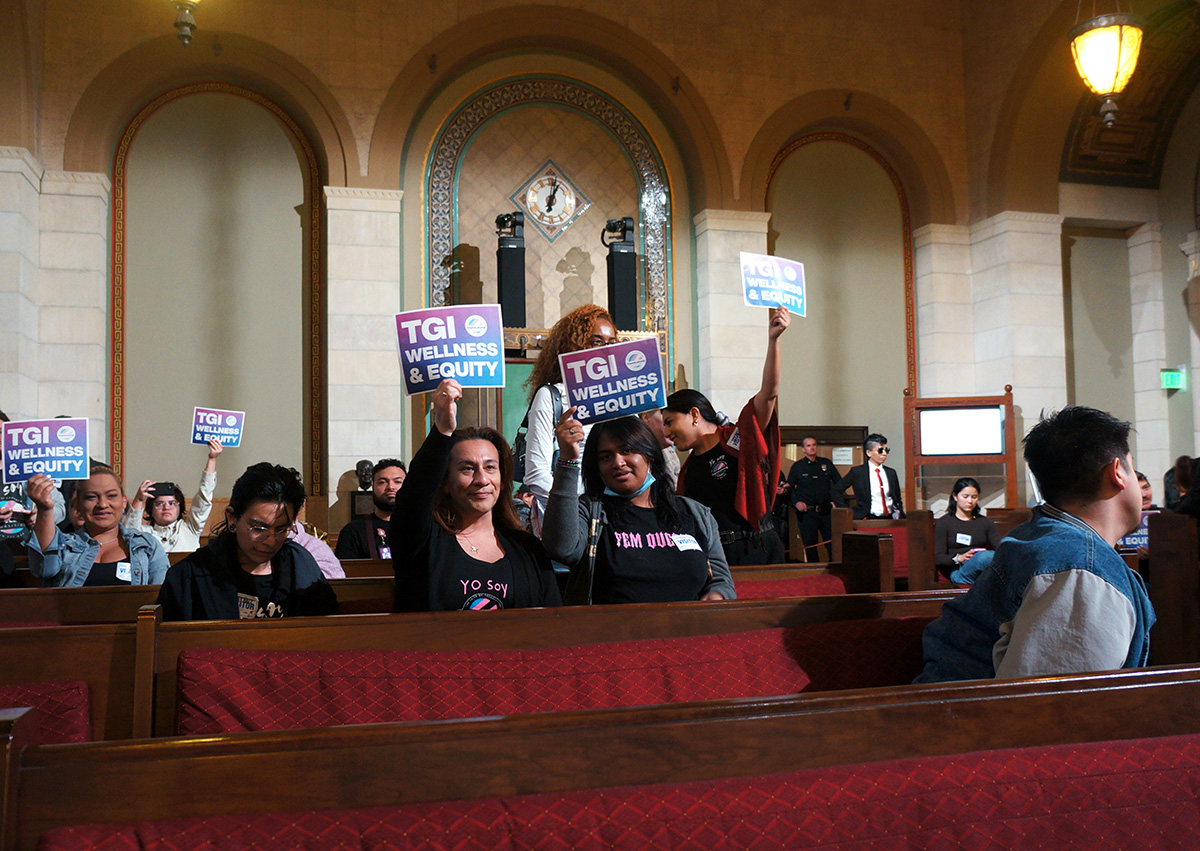
At 9 a.m. on Tuesday, ahead of L.A.’s regular city council meeting, a long procession of people wrapped around the entrance leading into the council chamber. Someone remarked that it was “unprecedented” to see so many people gathered, waiting to get inside. Several housing advocates and legal experts were waiting to make public comments about Measure ULA, otherwise known as the county’s “mansion tax.”
Another fifty or so transgender, gender expansive and intersex (TGI) advocates from the TransLatin@ Coalition (TLC), a long-standing organization that provides housing and meal support, legal services, mental health guidance and peer support groups, showed up to demand real, tangible support on behalf of themselves and their community members as the Mayor prepares the city’s budget on how funds will be allocated.
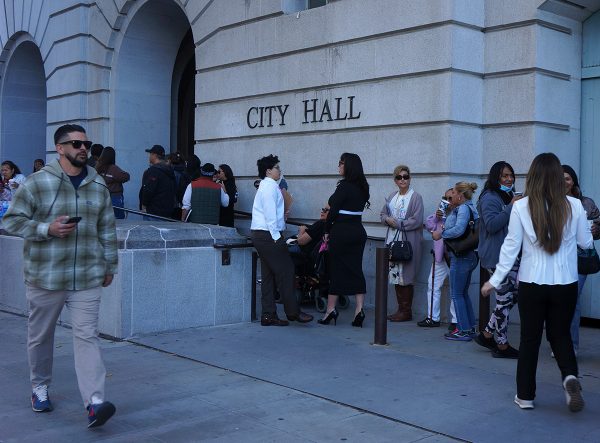
TLC advocates called on the city council to invest in their TGI Wellness and Equity Initiative (TGI WE), a two-year pilot program that would provide $4 million to five organizations that support the safety and rights of local TGI people. This money would expand each organization’s ability to hire more staff and expand their outreach, resources, and ability to serve a continually underserved community: TGI Angelenos who are multiply marginalized as violence against trans people and immigrants continues to increase.
During public comment, TLC president and CEO Bamby Salcedo requested that the council move forward with the initiative. Aside from general support, she asked that two council members act as co-sponsors and petitioners for the initiative. This way, TGI WE can be added as an official agenda item for future city council meetings, which would get the ball rolling for the initiative’s funding goals.
“Right now is the time to stand in solidarity with our community and stand against the federal government, who is attacking and trying to disappear trans people,” Salcedo told council members. Several other advocates, including TLC policy ambassador ChiChi Navarro, Christopher Street West board member NiK Kacy and Invisible Men director Jovan Wolf delivered passionate statements in support of TGI WE.
“Los Angeles is in a state of crisis, and our communities are running out of time,” Navarro told the council. They also spoke to the county’s growing investment in LAPD, while TGI organizations receive nothing. “This is not a resource shortage. It is a resource allocation choice [that] is costing lives. We need this council to introduce the TGI Wellness and Equity initiative immediately…We cannot wait. We need urgent investment today.”
TGI WE would fund community-run organizations that focus on individualized care that is facilitated with language support and sensitivity training, a kind of care that is crucial for TGI community members who often face criminalization and discrimination at the hands of law enforcement agents.
“We are their lifeline, and we demand your support,” Jovan echoed. “It’s time for the city of L.A. to make good on its promises to be for everyone…You and all of us know that we have been marginalized, pushed to the sidelines, and we continue to be an afterthought in your budgets and your agendas.”
When the meeting concluded, TLC members rallied together for a demonstration, calling out: “Support trans lives!” as council members filed out of the chambers.
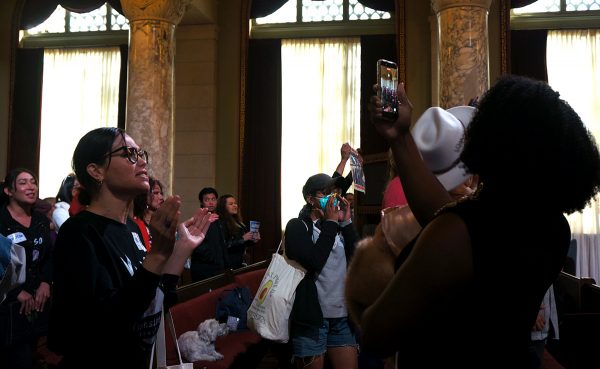
On the quiet walk back onto the street outside, Navarro reflected on the importance of this meeting and the effort community members made to be there. “A lot of the time, not just city council, [but] groups in general tend to forget trans people,” Navarro told the Blade. “Trans people are here. You saw today: clearly, we’re not a small pocket. I think we have to show them: we’re here [and] we’re not going anywhere.”
“It’s not great to be left in a place where you’re expected to continue to do the work, but without any actual support,” Navarro continued. Besides concrete funding, official citywide support for TGI WE would affirm that elected officials are willing to take a stance and take meaningful action when it comes to supporting TGI community members. “So it’s not just the money,” Navarro said. “L.A. has a motto, [that] L.A.’s for everyone. But I don’t know how you can say that when you’re not doing everything in your capacity to protect everyone.”
Kristie Song is a California Local News Fellow placed with the Los Angeles Blade. The California Local News Fellowship is a state-funded initiative to support and strengthen local news reporting. Learn more about it at fellowships.journalism.berkeley.edu/cafellows.
Los Angeles
UCLA’s long-standing LGBTQ+ alumni organization welcomes new president
The Blade sat down with paralegal studies professor and local advocate Bobby Rimas to talk about intersectional leadership and his goals for the UCLA Lambda Alumni Association.

As a young student studying history at UCLA, Bobby Rimas was grounded by his growing desire to give back to his community. He worked as a tutor for low-income students and became invested in learning about the ways intersectionality impacts people’s access to education and resources. “My barriers may not be the same as yours, and your barriers may not be the same as mine,” Rimas told the Blade. “How do you apply that in leadership [and] in the classroom?”
After 15 years of service to UCLA’s various alumni networks, first beginning with the Pilipino Alumni Association, Rimas became president of the university’s Lambda Alumni Association on Jan. 1. The UCLA Lambda Alumni Association was formed in 1989 as a way to support LGBTQ+ students and graduates with professional development, scholarship opportunities, mentorship, and other outreach support.
UCLA has long been a local epicenter of queer activism and advancement. Students formed groups like the Gay Student Union and Lesbian Sisterhood in 1969 and 1973, respectively, to empower and connect queer students. Queer art and culture also thrived in this time, as students saw the launches of the queer campus paper, magazine, and a film festival that centered on LGBTQ+ stories.
Administratively, campus officials were taking a stance against LGBTQ+ discrimination. In 1975, UCLA Chancellor Charles E. Young banned departments and programs from discriminating on the basis of sexual orientation.
In the decades since, leaders like Rimas are working to preserve this history and also build upon it. How can we inspire students in and out of the classroom? How do we make sure they have access to valuable resources and can advocate for themselves in places that are not always inclusive of their needs and identities?
Rimas often ponders these questions, both as president of the Lambda Alumni Association and at Cal State LA, where he works as an associate professor of paralegal studies. There is often cross-pollination in the concerns he receives from alumni members as well as his students: How do they find employers who are accepting of LGBTQ+ people? How do they avoid being discriminated against in the workplace?
These are questions Rimas hopes to tackle more in his role as president of the UCLA Lambda Alumni Association and in his continued tenure as an educator. One of his first goals is to expand the board and bring on more diverse perspectives to the organization. “More people means more activity,” Rimas said, who hopes that the combined knowledge and resources of the board can better serve students and alumni.
Rimas also hopes to throw a large Gala event, one that mirrors the extravagant, celebratory 2019 bash he organized for the association when he was first brought onto the team. 100 people attended, creating a wave of awareness for the organization and increasing their scholarship funding.
What’s next? UCLA Lambda Alumni Association’s first board meeting is this upcoming Monday. Rimas hopes to discuss strategies to grow the organization’s presence beyond the campus’ reach, in other queer cornerstones like West Hollywood, elevating diverse LGBTQ+ voices, and improving ways they can professionally support their network’s members.
Kristie Song is a California Local News Fellow placed with the Los Angeles Blade. The California Local News Fellowship is a state-funded initiative to support and strengthen local news reporting. Learn more about it at fellowships.journalism.berkeley.edu/cafellows.
Los Angeles
South L.A. celebrated Black joy and resistance at yesterday’s Martin Luther King Jr. Day Parade
The Blade also sat with staff from Center South, a community site that champions the safety and health of South L.A.’s LGBTQ+ communities of color.
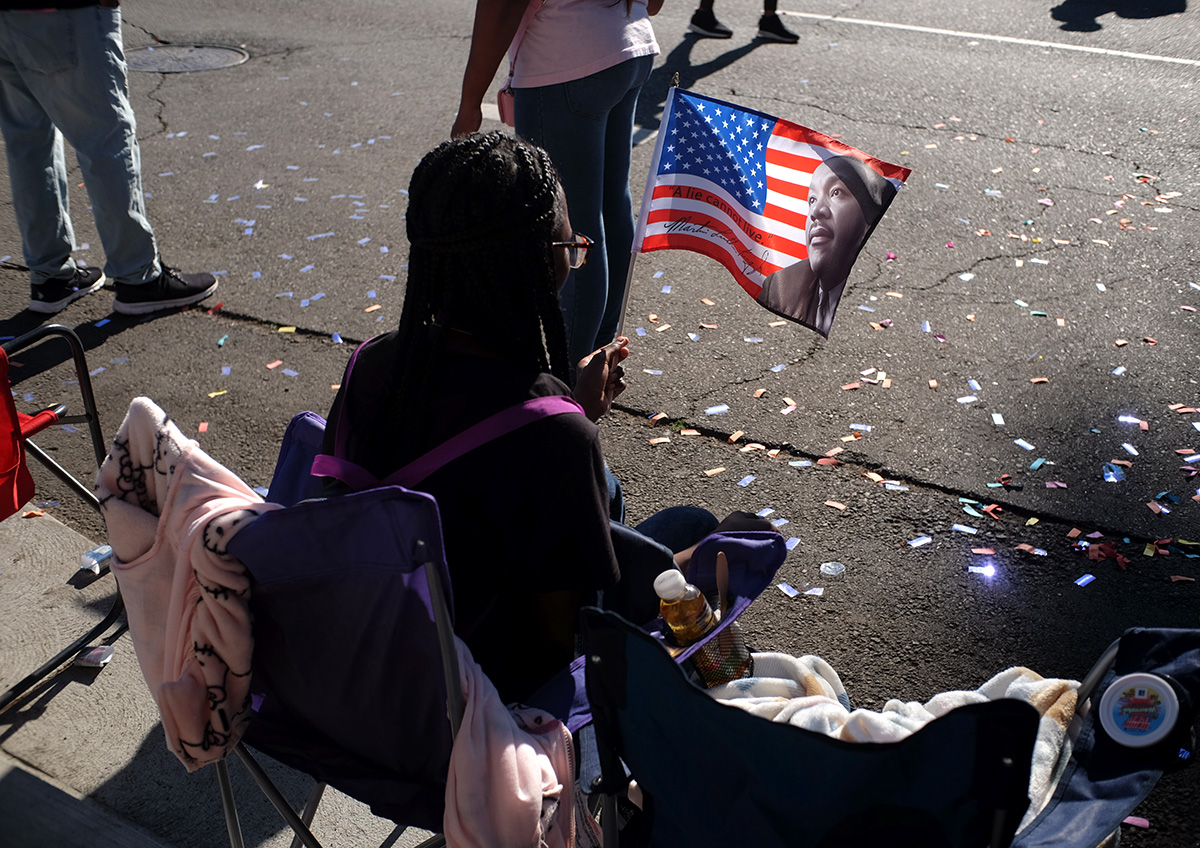
At 9 a.m. on Monday, Jan. 19, South L.A. community members gathered on the streets, holding onto lawn chairs and the hands of their children and family members. “Good morning,” one greeted. “Are you ready for the parade?” Neighbors laughed and hugged underneath the warm morning sun, staring into the horizon in anticipation of the county’s official Martin Luther King Jr. Day Parade, organized by Bakewell Media and the Los Angeles Sentinel Newspaper.
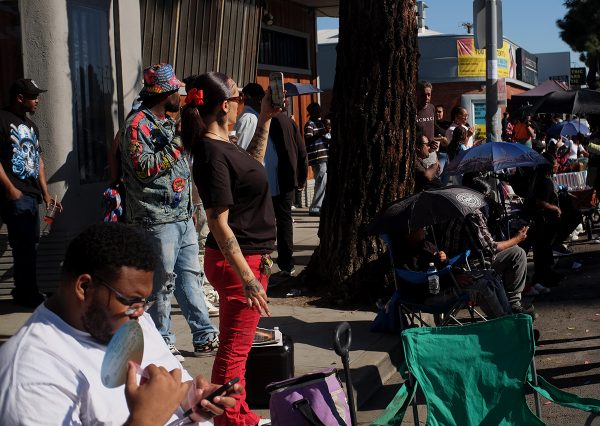
When the parade began an hour later, organizations like labor union SEIU Local 721, civil rights group Black Lives Matter Los Angeles, and HIV care and advocacy nonprofit AIDS Healthcare Foundation marched to cheers and waves from the crowd. Young musicians, drill and cheer teams from Marcus Garvey School and other schools stepped in unison, performing elaborate routines and sending jolting, infectious waves of drum and trumpet like electricity through paradegoers.
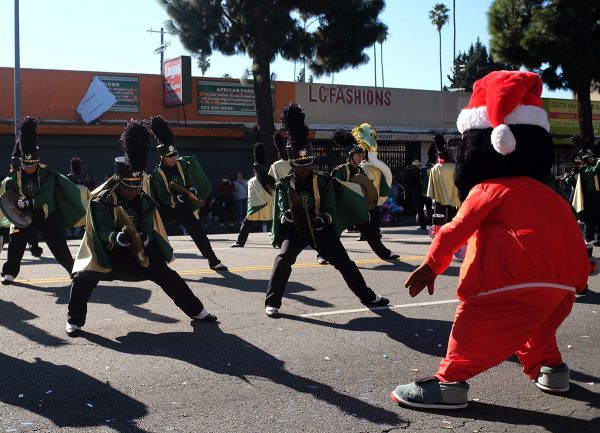
Black liberty and joy coalesced with a call to face injustice at yesterday’s festivities. Black Lives Matter Los Angeles members handed out flyers demanding accountability for Keith Porter, who was killed by an off-duty Immigration and Customs Enforcement (ICE) agent on Dec. 31. Marchers also waved the Iranian flag in solidarity with its people, who have faced increasing state-sanctioned violence after they began protesting the government in the midst of an economic downfall.
Communal care and empowerment remain, for many, the only way forward as trust in broader governmental systems and structures wanes. While celebrating the monumental work of the late civil rights activist, community members yesterday echoed an important, resonant message: The work is not yet done.
This community work is largely supported by local advocates and organizations like Center South: one of the Los Angeles LGBT Center’s community sites. Yesterday morning, ahead of the parade, senior program manager Steven Campa and fellow staff members welcomed people into the space for coffee and pastries.
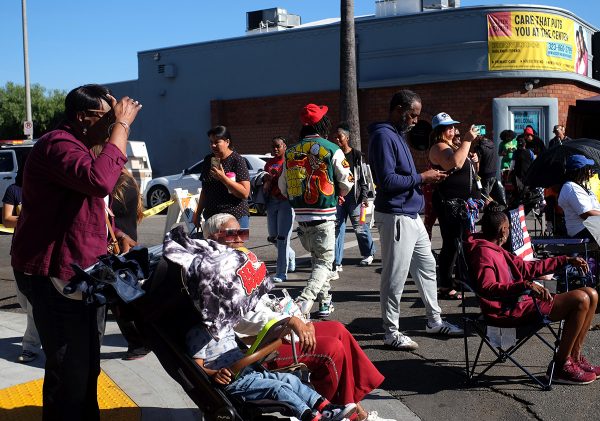
They also handed out flyers introducing residents to the site’s resources, which include: hygiene kits, HIV testing, a free monthly farmers market and clothing closet, mental health and primary care services, substance use and recovery programs, as well as social groups that prioritize LGBTQ+ people of color living in the neighborhood.
Center South opened six years ago, reclaiming a space that once housed a vibrant jazz supper club. At first, the site focused on providing services specifically for men who have sex with men (MSM), regardless of whether or not they identified as a member of the LGBTQ+ community. Over time, Center South became more inclusive of and responsive to the local community as a whole, becoming a safe space for anyone in South L.A. seeking refuge and care.
Campa, who has been with Center South since its founding, emphasized the constantly-evolving nature of the place as it molds itself to best serve and represent its community. Staff members and clinicians are nurtured by their own personal connections to the neighborhood, yearning to give back to the place that raised them.
And that has an effect. “How does it look to have a provider who’s queer: a provider that looks like folks in the community?” Campa said. “We’re our community. Folks grew up [here]…To speak to the MLK Day parade, this was a holiday for the Center. Folks chose to be here. Understanding that we are on MLK Boulevard, we want to continue to do [show up] every year to provide a safe space for the community.”
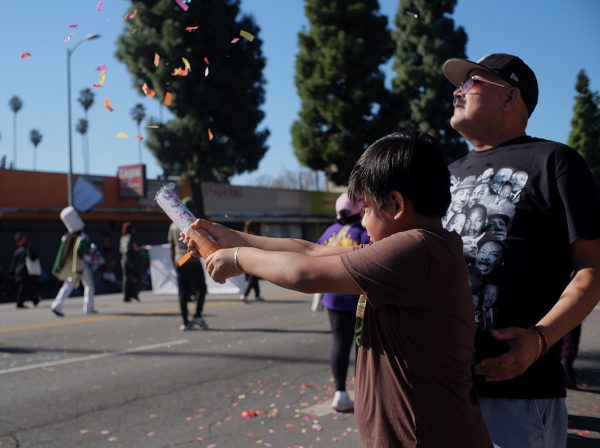
Campa, his staff members, and fellow Los Angeles LGBT Center staff want to expand what it means to be safe and healthy — and to see that reflected more broadly in their communities. “A healthy person needs medical care [and more],” said the Center’s chief equity officer, Giovanna Fischer, who showed up on Monday to celebrate the parade with the community. “[They also] need food access, immigration support…That’s definitely going to impact their health and wellbeing,” Fischer told the Blade. “
Campa, Fischer, and other advocates are strategizing for their community in uncertain times, as threats to instrumental funding are seemingly always on the table. But as they “forecast for the future” and continue to build a collective vision that uplifts LGBTQ+ people of color, their fight endures. “We deserve to think about where we want to go,” Fischer said. “We deserve the opportunity to dream and scheme, and so does our community. So until further notice, we’re going to continue to do that.”
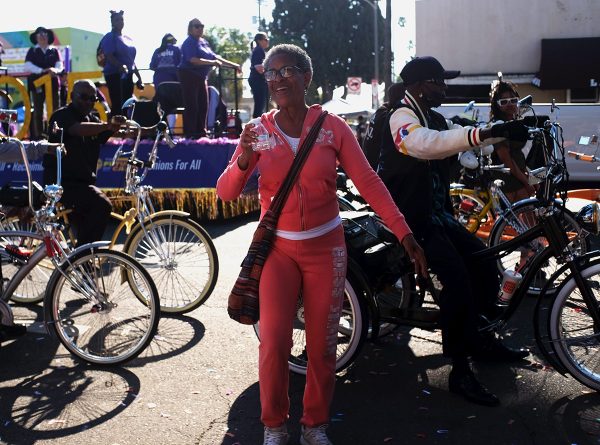
Kristie Song is a California Local News Fellow placed with the Los Angeles Blade. The California Local News Fellowship is a state-funded initiative to support and strengthen local news reporting. Learn more about it at fellowships.journalism.berkeley.edu/cafellows.
Los Angeles
Advocates demand that trans youth be protected as cases are argued in Supreme Court
This week, LGBTQ+ advocates and legal experts spoke in support of trans youth as two Supreme Court cases challenge their rights and safety.

This Tuesday, the Supreme Court heard oral arguments regarding two cases about transgender girls in sports: Little v. Hecox and West Virginia v. B.P.J.
In 2020, Idaho Governor Brad Little signed into law HB 500, which bans transgender girls and women from participating in school sports. This affected the first case’s respondent: transgender student athlete Lindsay Hecox, who was barred from participating in the track and cross country teams as well as intramural soccer and running clubs.
In 2021, then-governor of West Virginia, Jim Justice, approved HB 3293, which enacts a similar ban. Becky Pepper-Jackson (B.P.J.), now an incoming high school student, opposed the discriminatory policy when it prevented her from joining her then-middle school’s cross country and track and field teams. Pepper-Jackson has also only undergone female puberty due to gender-affirming care, but West Virginia argues that its anti-transgender policies should be upheld because of her assigned sex at birth.
For LGBTQ+ advocates and allies, these cases illustrate the burden and harm transgender people face daily as their rights to privacy, dignity, care, and inclusion are constantly at risk of being eroded and stripped completely.
Experts also wonder if these cases could potentially reshape the Constitution’s Equal Protection Clause as well as the civil rights law, Title IX. The former prohibits discrimination on other factors aside from race, though governments have argued that certain “suspect classifications” can be looked at more closely through “heightened scrutiny.” The latter prohibits sex-based discrimination in federally-funded schools.
What is unfolding and how local advocates are informing change:
The fight ahead is weary, and experts are certain that the states involved will not concede their points. In a webinar organized yesterday by the Williams Institute, several LGBTQ+ policy experts, including Rutgers Law School professor and anti-discrimination scholar Katie Eyer, examined where these cases may be heading, as well as efforts to muddy the arguments.
“It seems possible that the court might try to sidestep that issue here by saying that these laws don’t target transgender people at all,” Eyer said. “I think for most people, this seems bananas: like an upside-down world. We all know these laws were about transgender people.”
Jenny Pizer, an attorney for the LGBTQ+ civil rights legal organization Lambda Legal and a co-counsel member for the B.P.J. case, affirmed this sentiment at a press conference organized Tuesday by Lambda Legal and AIDS Healthcare Foundation affinity group, FLUX. “They’ve gone to great lengths to say there’s no discrimination,” Pizer said. “[They’re arguing] it’s just technicalities or classifications.”
Eyer was one of three Equal Protections scholars who filed an amicus brief to be considered in the Supreme Court cases. An amicus brief is a legal document submitted by someone who is not involved directly in a case but who may offer additional perspectives and information that can inform the ruling process.
Eyer’s brief provided historical context that clarified the disadvantages of blanket sex-based policies. These types of laws, according to Eyer, uphold stereotypes over nuance, truth, and equal protection guidelines. For Pepper-Jackson, who has only undergone female puberty and who does not “benefit” from what dissidents define as a sex-based competitive “advantage,” the state should have provided her the ability to argue that she should have the same rights as other girls.
“Of course, the state hasn’t done that here,” Eyer said. “Under these precedents, the Supreme Court should invalidate the laws as applied to those trans girls who really don’t have a sex-based competitive advantage.”
Who are these bills protecting?
The states argue that their policies are merely “ensuring safety and fairness in girls’ sports.” But queer advocates understand that this is a veneer for the exclusion of transgender people from society. Forcing trans youth out of sports “does not protect anyone,” according to California LGBTQ Health and Human Services Network director Dannie Ceseňa, who spoke at Tuesday’s press conference.
“It encourages the scrutiny of children’s bodies. It fuels gender policing, and it creates hostile school environments — not safer ones,” said Ceseňa. “Our youth should not inherit a world that treats their existence as a threat.”
Transgender people are systemically disempowered
At yesterday’s webinar, Distinguished Visiting Scholar at the Williams Institute Andrew Flores discussed his own amicus brief in support of Pepper-Jackson. The brief highlights the need for “heightened judicial scrutiny” in Pepper-Jackson’s case because the majority of political processes “systemically fail” transgender people.
For example, the transgender community faces substantial barriers in exercising their voter rights because of voter identification laws and other policies that regulate and define identity. “Even being able to gain access to the franchise is a burden for transgender people,” Flores said. “The court does play an important role there. It can grant legitimacy to arguments…or at least [acknowledge] that these issues are more complicated than maybe how they’ll receive them.”
What’s next?
Experts are hesitant about where the cases stand. “Bottom line: I don’t know what the court is going to do in these cases. They may send them back down for further development,” Pizer said, who thinks future rulings will not shift more overarching policies regarding transgender rights. “I think they will probably decide based only on laws about sports, not laws more broadly about the rights of trans folks.”
But whatever is decided, the impacts will trickle down to everyone. While the cases deal specifically with anti-transgender policies, experts warn that LGBTQ+ issues have always been tied to racial, economic, and disability justice. “There’s this looming constitutional campaign to really undermine civil rights,” said Eyer. “That affects LGBTQ people. It affects people of color. It affects people with disabilities. It affects everybody, and it really is concerning.”
As transgender inclusion and safety are being argued on the largest legal stage, advocates are asking: “When are you going to step up?” They are also sending a direct message to transgender youth: “We see you, we believe in you, and we are fighting for you,” said Ceseňa. “You deserve joy, community, and care. You deserve a future that reflects who you are and not who anyone or any politician demands you to be. Trans youth deserve better.”
Kristie Song is a California Local News Fellow placed with the Los Angeles Blade. The California Local News Fellowship is a state-funded initiative to support and strengthen local news reporting. Learn more about it at fellowships.journalism.berkeley.edu/cafellows.
Los Angeles
AIDS Healthcare Foundation will celebrate its legacy of food relief at the New Year’s Rose Parade
This Thursday, AHF will march at the Rose Parade in celebration of its “Food for Health” program: an initiative that has fed community members in need for five years.

This Thursday, the AIDS Healthcare Foundation (AHF) will march in the highly-anticipated Rose Parade in Pasadena. AHF will present a Jack and the Beanstalk float with the titular character climbing amongst ginormous tomatoes, eggplants, strawberries, and tomato plants. It’s befitting of this year’s parade theme: “The Magic in Teamwork,” which celebrates the power of collective effort and unity.
The whimsical design also honors the organization’s “Food for Health” program, an initiative that began in 2021 to respond to food insecurity across the U.S. For nearly five years, “Food for Health” has hosted free food pantries and farmers’ markets, providing hot meals and fresh groceries nationally for families and veterans in need of food assistance.
“Food for Health” was also crucial in the wide-sweeping emergency response various nonprofits were trying to organize after the devastating Palisades and Eaton Fires in January. AHF’s program delivered over 75,000 hot meals to evacuees and Los Angeles Fire Department (LAFD) first responders.
The float also honors the individuals fueling these on-the-ground efforts, like Janet and Christy Lee, the sisters behind Altadena’s Fair Oaks Burger. For eight months after these major fires broke out, the Lee sisters worked closely with “Food for Health” to host free weekly farmers’ markets in the parking lot of their restaurant to support community members who had been displaced and impacted by the wildfires.
Both sisters will join fellow local advocates and leaders like labor activist Dolores Huerta, LAFD Captain Thomas ‘Kit’ Kitahata, Champions of Caring Connections executive director Bettye Randle, and “Food for Health” directors Carlos Marroquin and Tara O’Callaghan as riders on the AHF float.
The Rose Parade begins at 8 a.m. on Thursday morning, marching through 5 miles of Colorado Blvd. Now in its 137th year, the parade’s inaugural event was held in 1890 and continues to delight local residents and usher in the new year with illustrious musical performances and grand floats. More information about tickets and parade guidelines can be found on Pasadena’s Tournament of Roses website.
Kristie Song is a California Local News Fellow placed with the Los Angeles Blade. The California Local News Fellowship is a state-funded initiative to support and strengthen local news reporting. Learn more about it at fellowships.journalism.berkeley.edu/cafellows.
Los Angeles
Recent L.A. County report reveals record number of hate crimes against transgender and nonbinary community members
The county’s Commission on Human Relations (LACCHR) released its annual hate crime analysis, revealing a rising violence against LGBTQ+ Angelinos.

Last Thursday, Los Angeles County’s Commission on Human Relations (LACCHR) released its 2024 Hate Crime Report, which analyzes data compiled from over 100 reporting groups, including local law enforcement agencies, educational institutions, and community-based organizations like the TransLatin@ Coalition. In its 45-year history of compiling these reports, the LACCHR recorded an “unprecedented” amount of hate crimes in this most recent analysis.
The report states that there were 102 anti-transgender crimes, “the largest number ever documented in this report.” 95% of these reported incidents were violent.
Part of the reason for this increase in reported crimes is the expanding outreach LACCHR is trying to create with partner organizations, ensuring that queer community members feel increasingly safe in reporting crimes that have been committed against them. These “grassroots efforts” have proven invaluable in building community trust, according to Dr. Monica Lomeli, who leads the production of LACCHR’s annual hate crime report.
“For the LGBTQ community, [there’s] a history of not being heard, not being believed or being misgendered,” Lomeli told the Blade. “I remember us working with a lot of different law enforcement agencies [and] victims would tell us: ‘They keep misgendering me. They don’t believe me. They keep having me make different reports.”
Lomeli stresses that, for those who feel unsafe reporting hate crimes to law enforcement agents, there are other options. One of these pathways is the commission’s community-centered initiative and reporting system, LA vs Hate, which allows people to report hate crimes and access resources like multilingual reporting guides. There is also 211 LA, a program funded by the commission that provides free, confidential support in 140 languages.
The report is instrumental to the formation of initiatives focused on queer safety and is also a resource to various LGBTQ+ organizations as they track violence committed against their community members. But the collection of this data has not been smooth, especially in this current administration.
Lomeli explained that, earlier this year, the now-defunct Department of Government Efficiency (DOGE) reached out to various human rights organizations, including the LACCHR, and was aiming to gain access to and shut down the commission’s hate crime database. “There was an attempt to bring down our data,” said Lomeli, who described these attempts as an infringement on the general public’s ability to access the report’s findings.
Moving forward, the commission’s Network Against Hate Crime, which hosts quarterly meetings with leaders from law enforcement agencies, advocacy groups, educational institutions, and social services providers, will hold a briefing on the report and discuss collaborative solutions to support community members.
Lomeli hopes to bring LGBTQ+ issues to the “forefront” of one of these upcoming meetings, given the high number of hate crimes committed against queer community members that were highlighted in the report. LA vs Hate will also continue to host campaigns, marketing efforts, and awareness events to promote the equitable treatment and safe existence of queer and other marginalized Angelinos.
Kristie Song is a California Local News Fellow placed with the Los Angeles Blade. The California Local News Fellowship is a state-funded initiative to support and strengthen local news reporting. Learn more about it at fellowships.journalism.berkeley.edu/cafellows.
-

 Features5 days ago
Features5 days agoWhat’s next for “local hero” and longtime queer ally Genevieve Morrill
-

 Arts & Entertainment19 hours ago
Arts & Entertainment19 hours ago2026 Best of LGBTQ LA Finalist Voting
-

 Mexico3 days ago
Mexico3 days agoUS Embassy in Mexico issues shelter in place order for Puerto Vallarta
-

 Out & About2 days ago
Out & About2 days agoQueer, trans AAPI joy shone at this year’s Golden Dragon Parade
-

 Health2 days ago
Health2 days agoWhere medicine meets dignity: Be Well Medical Group founder Isaac Berlin is here and queer to serve the community
-

 Movies4 days ago
Movies4 days agoRadical reframing highlights the ‘Wuthering’ highs and lows of a classic
-

 a&e features5 days ago
a&e features5 days agoLiveplay series ‘Gladlands’ finds hope in the unlikeliest of places
-

 Autos2 days ago
Autos2 days agoGoing for gold: Ford Bronco Sport vs. Toyota RAV4
-

 California22 hours ago
California22 hours agoExperts discuss pathways forward as anti-trans violence continues to rise
-

 a&e features4 days ago
a&e features4 days ago‘Pee-wee as Himself’ and ‘Lurker’ directors on how queer audiences have reacted to their Spirit Award-winning films

